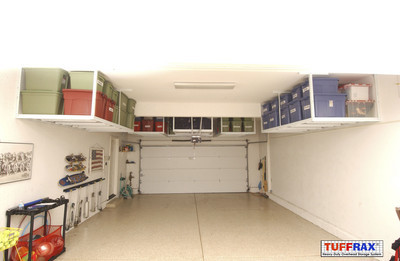Made to order

In the good ol’ days, it used to be that a man’s home was his castle, while the garage was his mistress, his secret hideout and his home away from home. There he could hang posters, keep an endless supply of beverages in the 20-year-old, dented refrigerator, and wile away the hours. Today, though, the garage is often treated as nothing more than a giant closet where homeowners store their seemingly endless supply of stuff.
Doug Baird of Southwest Garage Cabinets (www.swgaragecabinets.com, 636-9911) understands this and has only one suggestion: storage cabinets.
“Here in the valley, (most homes) don’t have basements like in other parts of the country and the garage has a lot of unused space than can become usable,” he said.
Storage cabinets can be made in virtually any configuration, fit easily on the outer edges of the garage so they don’t interfere with garage doors and are available in a variety of materials.
And if you want to get your stuff truly out of the way, there are overhead storage racks.
“Our overhead storage racks are made of 16-gauge steel and can be customized to fit any garage. They hold up to 600 pounds and once you get stuff off the floor and onto these racks, it’s amazing how much more room there is to park cars and create additional space.”
Baird attaches the rack, via the wood joist, to the house. It hangs no more than 3 feet from the ceiling and all that is needed to reach whatever is stored there is a sturdy stepladder.
“The idea of overhead storage racks is to store things you only need about once or twice a year,” he said. “For instance, most people store holiday decorations, baby clothing, luggage or camping equipment. Accessories can be added to the racks to hang bikes, surfboards or ladders. And best of all, there is a choice of color and finish.”
At The Ultimate Garage (www.theultimategarage.org, 856-6014), co-owner Michelle Taylor said most homeowners know what they want, but often ask for recommendations.
“We’re more than happy to visit a site, take physical measurements and make suggestions,” she said. “A 4-foot-by-8-foot rack is considered a standard rack and we usually install one or two, three at the most, in a typical two-car garage. It takes us about one hour. What we find is that our best customers are repeat customers because once they discover how useful these overhead racks are, they want a second one.”
Taylor said open mesh wire decks allow for easy viewing of items from underneath, unlike wood platforms and attic storage. The open mesh also allows air to circulate and that prevents dust accumulation, or termites and rodents from nesting among the storage.
“One of the products we use is a modular system where units with the same depth can be directly attached to each other for flexibility,” Taylor said. “While units that are 4-feet deep are ideal for above the garage door, the modular design enables complete lofts to be created along all four walls in configurations such as I, H, L, T or U layouts.”
Once everything is off the floor, the next step is the garage floor itself. Interlocking floor tiles have rollover strength, are able to support heavy vehicles, are not damaged or stained by most chemicals including oil, grease, brake fluid, petroleum products or battery acid, and fight off bacteria, mold and mildew. Additionally, tiles, such as Kiwi or Swisstrax, are nonslip, skid resistant and easy to clean.
A floor tile representative at Home Depot said polypropylene tiles require no adhesives or tools and can be laid over cracks or uneven surfaces. They are strong enough to support cars and small trucks on jack stands, and are available in a variety of colors and designs.
He went on to say that another method to protect the garage floor is with an epoxy sealer that, in some cases, can be harder and more durable than the concrete itself. A hard epoxy paint film is so dense that oils and fluids cannot penetrate its surface to soak in and cause staining. It should be applied at temperatures between 60 F and 90 F and is not recommended for application over existing coatings because the existing coating will inhibit the bonding of the new epoxy to the concrete floor.